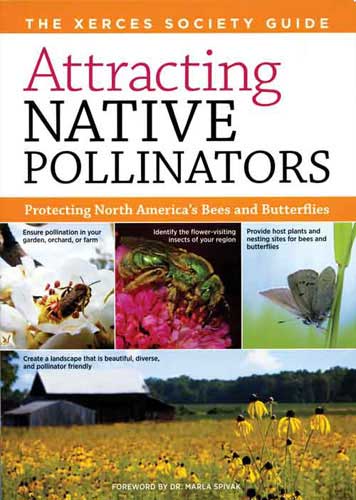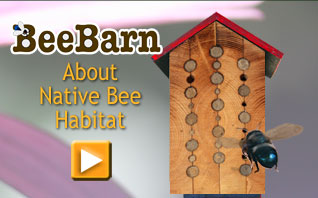Environment & Energy
Related: About this forumThis is what your supermarket would look like if all the bees died off
http://grist.org/list/this-is-what-your-supermarket-would-look-like-if-all-the-bees-died-off/From bee-killing companies pretending to love bees to researchers frantically trying to create a disease-resistant superbee, it’s been kind of a rough week for bees, who have already been having a rough couple of years due to dying off left and right. But why should you care? It’s not like bees are delivering your mail or making you dinner or sewing your clothes, Cinderella-style.
But bees DO pollinate a bunch of shit that you probably like to eat. Need a visual? Check out these before and after pics from Whole Foods that illustrate the amount of produce that would vanish if all the bees died off:
 ?w=470
?w=470secondvariety
(1,245 posts)Even citrus benefits from cross pollination by bees. A lot less fruit per tree without it.
Why is it the beneficial wildlife is always the ones threatened? Gnats, ticks and fleas- absolutely worthless, nothing eats them, they're a scourge and yet they thrive.
Botany
(70,501 posts).... and that vast majority are beneficial ..... btw here is a night flying gnat eater:

secondvariety
(1,245 posts)Good to know. What about fleas and ticks?
Champion Jack
(5,378 posts)secondvariety
(1,245 posts)must have fabulous eyesight. My grandparents used guineas and peacocks as security when they lived in South America.
Any creature bigger than a mouse would set them off.
NickB79
(19,236 posts)They started living semi-feral, migrating from farm to farm and nesting in fields and haybarns. Eventually a hard winter would come along and kill them off, but there would always be a farmer somewhere in the neighborhood that would buy a dozen or so chicks with his spring chicken order, and the cycle would start again.
lordsummerisle
(4,651 posts)Spitfire of ATJ
(32,723 posts)thelordofhell
(4,569 posts)1. Empty half a can of beer
2. Cut top off of can
3. Place can in dark area not accessible by your pets
Roaches love beer and will go into the can and won't be able to get out and drown in the beer.....throw away in about a week or when can is full of dead roaches.
![]()
rhett o rick
(55,981 posts)oldhippie
(3,249 posts)nt
rhett o rick
(55,981 posts)Buzz Clik
(38,437 posts)thelordofhell
(4,569 posts)It's said that frankenfood pollen contributes to bee die off
Buzz Clik
(38,437 posts)Did they ever publish their findings?
thelordofhell
(4,569 posts)Buzz Clik
(38,437 posts)sarge43
(28,941 posts)Without honey bees, we would still have food, but a lot less of it and a lot more expensive.
Heather MC
(8,084 posts)Champion Jack
(5,378 posts)NickB79
(19,236 posts)Don't get me wrong, I fully support using a home aquaponic system if you have the space. I'm currently trying to convince my wife to let me raise tilapia in the old hot tub we never use anymore ![]()
However, it's primary purpose is to supplement the production of more conventional fruits, vegetables and grains from soil-based fields, not replace it altogether.
Heather MC
(8,084 posts)I am building a small system in my dining room. Check out my YouTube vids at BlkOnyx488
I have found a ton of great information using YT video s for Aquaponic
Botany
(70,501 posts)Last edited Sat Jun 15, 2013, 11:21 PM - Edit history (1)

Lots of money and time is being spent on the european honeybee but it is much more
important to save the native pollinators .... they too can help in food production and in
many cases they can do a better job then the european "french/gay/socialist/free health
care" bee.
1. plant native plants
2. make sure you provide habitat for the native pollinators
3. limit your use of insecticides
4. limit the size of your lawns
5. Get and read the above book .... no need to learn all the different type of bugs.

MNBrewer
(8,462 posts)was very interesting.
dixiegrrrrl
(60,010 posts)Locally called "news bees" because they fly so close to your head, like they are listening to you.
Perfectly harmless.
I gotta ask Mr. Dixie to make them a nest.
Right now they are burrowing into my redwood potting bench, then parasitic wasps move in and try to take over the holes.
timdog44
(1,388 posts)are selling our 2 acre garden of eden. We have changed all lawn to at least 60% native plants, native tall prairie grasses, huge garden, and native perennials all over the place. No pesticides, insecticides, herbicides, no -cides at all. We always counted our success by the number of butterflies and bees of all kinds we had. We are fortunate to have been here for over 25 years. Time and my back have taken the toll and we have to leave. We cry, but we have to move on. Hopefully we can find a place with a small yard that we can do something with.
We live in the middle of Illinois farm land. GMO all over the place and Roundup in the farmers coffee. Weeds growing in their sterile fields becasue the Roundup no longer works. No bugs, bees, or birds. It is criminal how agriculture has evolved in America. The mantra of the farmer "we feed the world" is susch bullshit. We import almost as much as we export. All these massive farms have taken away from America a great and prideful way of life. And these guys like to call themselves farmers. Corn and bean manufacturing plants. And the people who own the farms don't know the difference between a kernel of corn and a shoat. Real farmers have their own animals out eating hay and grass in their fields, have their own gardens, chicken running around eating garden pests, and growing unperverted grains.
dixiegrrrrl
(60,010 posts)Totally understand what you are giving up, and why.
I was disappointed that my 2 sons did not want to practice organic gardening when I was so deeply involved in it 20 years ago.
Today, I cannot move as easily as back then, and my world has shrunk from a 15 acre farm to a 1 acre house and yard.
I AM encouraged to see a lot of younger people taking up organic living, tho.
timdog44
(1,388 posts)Hopefully we will find somewhere with a new "palette" to start with.
That had to be fun to be on a farm like that. I started my gardening almost 50 some years ago with my Dad. He was an original subscriber to Mother Earth News and had all the appropriate Rodale books.
I too am encourage to see young people going organic and self sufficient. It is a great life. To bad the ole body won't keep up.
And nothing but good on you from me.
Botany
(70,501 posts)..... even on a small scale. A rotted log and some bare earth will give the good bugs
a place to live and if you can slip in a swamp red milkweed or a joe pye weed or a
winterberry holly all the better. New england aster is the bomb.
from the what I have read about what you have done you have made things better.
BTW .... i know about old bodies but I can tell that when you see a humming bird moth
or a monarch caterpillar you will be "young again."
BTW part 2 .... the book I listed above is outstanding (attracting native pollinators) is worth
the read
timdog44
(1,388 posts)I just ordered it and it will be here in two days. Thanks for the kind words and encouragement.
dem in texas
(2,674 posts)I saw a show about the bee decline and it showed Chinese people hand pollinating the apple trees because the bees are already gone in the area.
happyslug
(14,779 posts)The problem with Native Bees and Bumble Bees is they have small colonies (Often just one small nest) and thus can not be moved around like Honey Bees can be. Thus mono-culture will have to be replaced by multiple crops in a given area, with each crop coming into flower one after each other, Ike in the days before mono-culture. Instead of acres and acres of Almond trees, you would have an acre of almonds (Flowers in February and March). An acre of Apples, plums or cherries (All Flower in April), an acre of Blueberries, blackberries or raspberries which tend to flower in May. Cucumbers, Melons, Sunflower or Pumpkins flower in June. Buckwheat, Soybean and Alfalfa all flower in July. Melons and Pumpkins have blooms till October. Sunflowers are a source of nectar till September, Soybean till October.
Of the "Species", Chives is good from May to October, Carrots till September. On small farms, you have borders where wild flowers and trees grow, all of which come into flower throughout the year. Thus you can have all of the products you remove, providing you are willing to pay a small farmer to grow all or most of them on various parts of his farm. Multi-Culture NOT Mono-Culture. You lose economy of scale, but the amount of product will be about the same.
Bees go dormant in October or November (Depending on what is in flower AND the temperature) and go active in late March (again depending on temperature and what is coming into Flower, Maples and other trees flower early and if it is warm bees help pollinate them.
Some comments on Wild Bees:
http://www.npr.org/blogs/thesalt/2013/03/01/173167125/wild-bees-are-good-for-crops-but-crops-are-bad-for-bees
Nectar Sources for Bees (Why old Farmers keep flowers around their homes, it provided bees Nectar when the crops were note):
http://en.wikipedia.org/wiki/Northern_American_nectar_sources_for_honey_bees
Mono-culture is so bad in Almonds that, except for bees brought in to pollinate the Almonds, there are no native bees, or wild honey bees in the Almond area of California due to the lack of any source of nectar once the almonds flowers died out.
Just pointing out there is a solution, but it is a solution that today's large corporate farmers do not want to hear, i.e. go to a multi-crop system so that bees and native pollinators have flowers all year round so they can survive. In such a system the economy of scale of having a large farm just dies out.
Please note, a hive can travel many miles to search for nectar but it takes about one hive per acre to pollinate that acre.
http://en.wikipedia.org/wiki/Pollination_management
NickB79
(19,236 posts)Which means things could get really dicey if we lose those as well.
happyslug
(14,779 posts)Native bees need FLOWERS to come into Bloom all year long. Thus most farmers had flower gardens that the bees could pollinate when the crops were NOT in Flower.
The problem with mono-culture is that they are no other plants permitted in these areas and thus no flowers for ANY bee, native, bumble or honey to seek nectar from. Without Nectar, the bees must move elsewhere or die, thus you see a huge decline in ALL bees due to mono-culture.